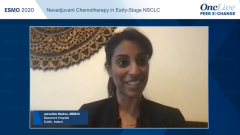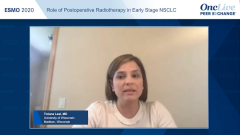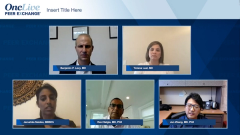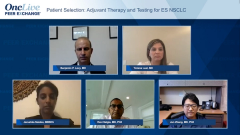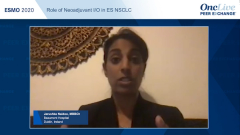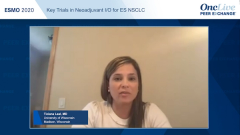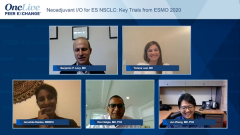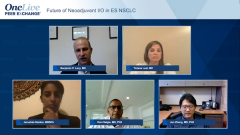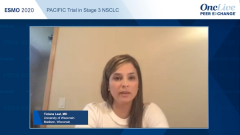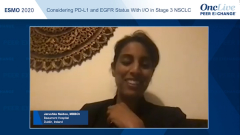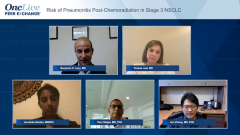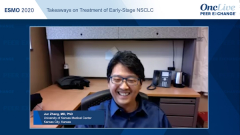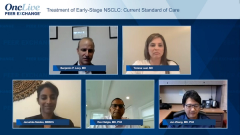
Future of Neoadjuvant I/O in ES NSCLC
Episodes in this series

Benjamin P. Levy, MD: Where do we go from here? What are the trials that we need, or what trials are currently going on in this space that hopefully will help answer these questions? Do we have phase 3 trials coming out in this space? If so, when will we know answers? Does anybody on the panel want to take the lead on general approaches for the neoadjuvant setting? We’ve got a lot of phase 1/2 trials here. Where do we go from here?
Jarushka Naidoo, MBBCh: There are certainly large, international phase 3 studies that are looking at this. The differences in the approaches between countries will matter. Obviously, patients are generally sold on immunotherapy and the activity of immunotherapy in lung cancer. These studies, where available, are going to be taken up with a great deal of enthusiasm.
It’s not the same cancer, but there’s a cooperative group study of limited-stage small-cell disease using immunotherapy. You know, a rare beast. But that study is over accruing. It is accruing faster than they thought was possible. So I think there will be a lot of excitement for these studies.
Obviously, only 20% to 30% of our patients, on a good day, have early stage or resectable disease. The other factor is that we need to do better in identifying earlier-stage lung cancer patients if this is really going to be an effective treatment. That goes hand in hand with this. The majority of our patients have stage IV disease. The advances here are going to need to be coupled with advances in lung cancer screening and those kinds of studies.
Benjamin P. Levy, MD: Yeah. I want to see—and there are trials ongoing—neoadjuvant chemotherapy vs neoadjuvant chemotherapy with I/O [immuno-oncology]. We can consider neoadjuvant chemotherapy the standard of care if you’re going to consider neoadjuvant therapy. Having randomized trials such as ones that explore chemotherapy vs chemotherapy with I/O would be the most relevant to me to help answer questions about toxicity, major pathologic response, complete pathologic response, and outcomes. We’ve run into this in our own centers, and we don’t like to talk about it, but sometimes it takes the surgeon’s buy-in. Is this something that you guys experience at your institutions? Dr Leal, you’re smiling a little. Do you have to have the surgeon’s buy-in here?
Ticiana Leal, MD: Yeah, for sure. It requires multi-D [multidisciplinary care] to the max. The reason why I’m smiling is we have a recent neoadjuvant trial in which the surgeons are coinvestigators. We actually persuaded 1 of the surgeons to sit through an SIV [site initiation visit] with us and be a part of every step. Obviously, they buy into it. We have a great multi-D team. We have a great group of thoracic surgeons. It’s not something that has been historically on their radar. It’s really a shift in how you think about clinical trials and really work together to advance the field in a meaningful way. We need buy-in from the thoracic surgeons, and we need buy-in from the pathology group. This has really been an incredible effort to get everybody on board to get these trials up and going.
Benjamin P. Levy, MD: It takes a village on so many levels. Dr Salgia, your thoughts on this and getting the surgeons to buy in to this strategy?
Ravi Salgia, MD, PhD: I like what you said, Dr Levy. It takes a village. And I like the new term, Dr Leal. I’m going to say multi-D rather than multidisciplinary. It absolutely takes that communication. What I love is that we’ve come a long way. In the old days, it used to be 1 specialty vs another specialty. It really is a combined effort now. Our surgical colleagues see that early stage patient, and then we all do clinics together. It makes it easier. Our surgical colleague might say, “Hey, Ravi, are you able to see this patient today? You’re in clinics and so forth.” It makes it so much easier.
Those days where it took weeks and weeks to see a patient are gone. With this cross-communication, having the cross–multi-D clinics altogether, it makes things so much easier. That’s really what we envisioned as the future in the past, and it’s here. I’m very happy with that.
Benjamin P. Levy, MD: That’s a great summary. Just going back to Dr Leal’s comment, I would propose that the surgeon who attended the SIV should get an award. I’ve never heard of such a thing. That’s just emblematic of the need to communicate and all be on the same page with not only the clinical care but the science. Everyone is right on target with what we must do moving forward. Dr Zhang, what is your experience with this? Discuss your interface with the surgeons and how to pull this off.
Jun Zhang, MD, PhD: Our surgeons have had concerns about whether immunotherapy induces some toxicity, so that a patient would no longer be a perfect candidate for surgery or that there’s some delay. But based on those clinical trials, they are now more convinced. We need to do something in early stage lung cancer. But for surgery, there’s a big change, and they’re really into it now. In fact, we also have clinical trials using neoadjuvant immune checkpoint inhibitors.
Benjamin P. Levy, MD: For those patients who are going on neoadjuvant trials, is there patient reluctance? Or are patients saying, “I just want this out. I don’t want to wait to get the treatment.”? We’ve run into this issue before. We thankfully got the surgeon and the medical oncologist on board. But the patient said, “I don’t want to wait. I’ve been taught that this needs to come out. I’ve always been told cure is achievable through surgery.” Is that happening at other institutions? Dr Zhang, go ahead.
Jun Zhang, MD, PhD: Yeah. In fact, I have patients like this. I have a guy who just wants to get this done as soon as possible. Of course, when you discuss neoadjuvant clinical trials, mention potential risks, etc, they don’t want to lose any chance that their cancer can’t be resected. Certainly there is, but I would say the majority of patients are interested in participating in a clinical trial that hopefully offers longer survival or a chance for cure.
Ravi Salgia, MD, PhD: I agree completely, Dr Zhang. In the old days, it used to be much more of an issue. If it were some cytotoxic therapy, or given in combination with bevacizumab, patients were reluctant. But this doesn’t happen as much now because patients are seeing this information flow through on social media. You even commercials on TV. Patients want to be part of an interesting and important clinical trial, and I certainly think it will become standard of care for us in the next few years.
Benjamin P. Levy, MD: One last question. For patients who are EGFR mutant, is this the right modality? Let’s say we know that they’re EGFR mutant from the biopsy, not necessarily from the surgical resection. Do we pump the brakes on neoadjuvant immunotherapy given that we’ve got a great adjuvant drug? Do we not have enough data? This is a tough one. Dr Naidoo, I see you’re thinking hard about this one.
Jarushka Naidoo, MBBCh: Yeah, no data. We encountered this a couple of times in various different patients who were being considered. In many of the neoadjuvant studies, these patients are not necessarily excluded. We know this was the case for PACIFIC as well, which I know we’ll get to. It opens up a bit of a quagmire for what to do next in the patients who have received immunotherapy. It’s an evolving experience. Obviously, we’ll discuss that in the context of PACIFIC. But right now, these patients are definitely being enrolled, and we will have to see whether they derive equivalent benefit, don’t derive the same benefit, or have different toxicities. Until we have the data, it wouldn’t behoove us to exclude these patients from this opportunity in case they may benefit.
Benjamin P. Levy, MD: Any parting words on the role of neoadjuvant immunotherapy for EGFR-mutant lung cancer?
Ravi Salgia, MD, PhD: Yeah, I’m not a fan, to be honest. I think these tumors are cold tumors. Are we doing a service for our patients, knowing the data for stage IV disease and then applying it to early stage disease? I’m not necessarily sure. It’s clinical-based evidence rather than evidence-based medicine. Without haing that trial, I just don’t know if it’s appropriate to put your EGFR or ALK patients on these trials. We have to be very concerned about that. That’s why we do next-generation sequencing for everyone. Then we have that discussion with our patients.
Benjamin P. Levy, MD: All good points.
Transcript Edited for Clarity


